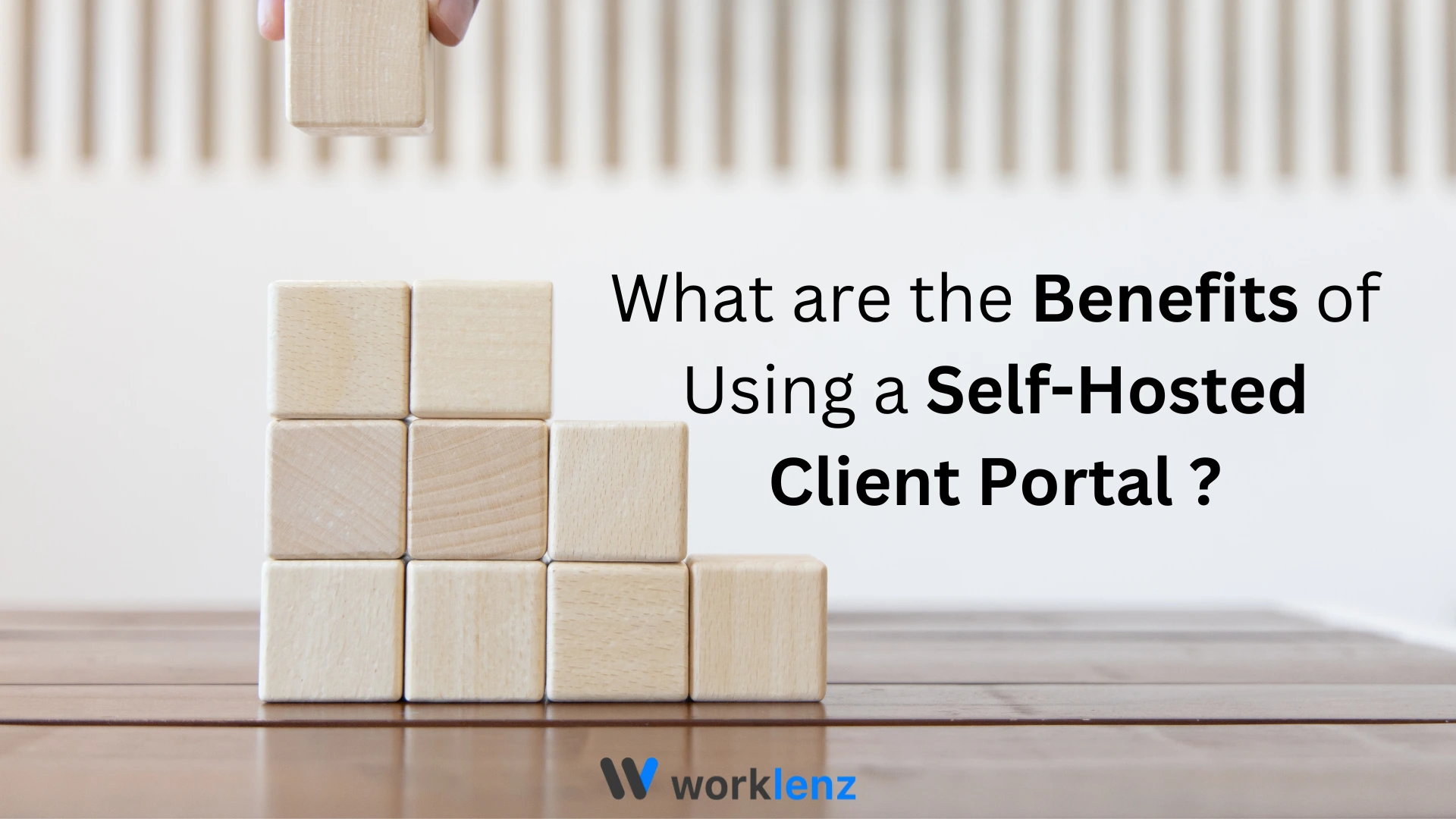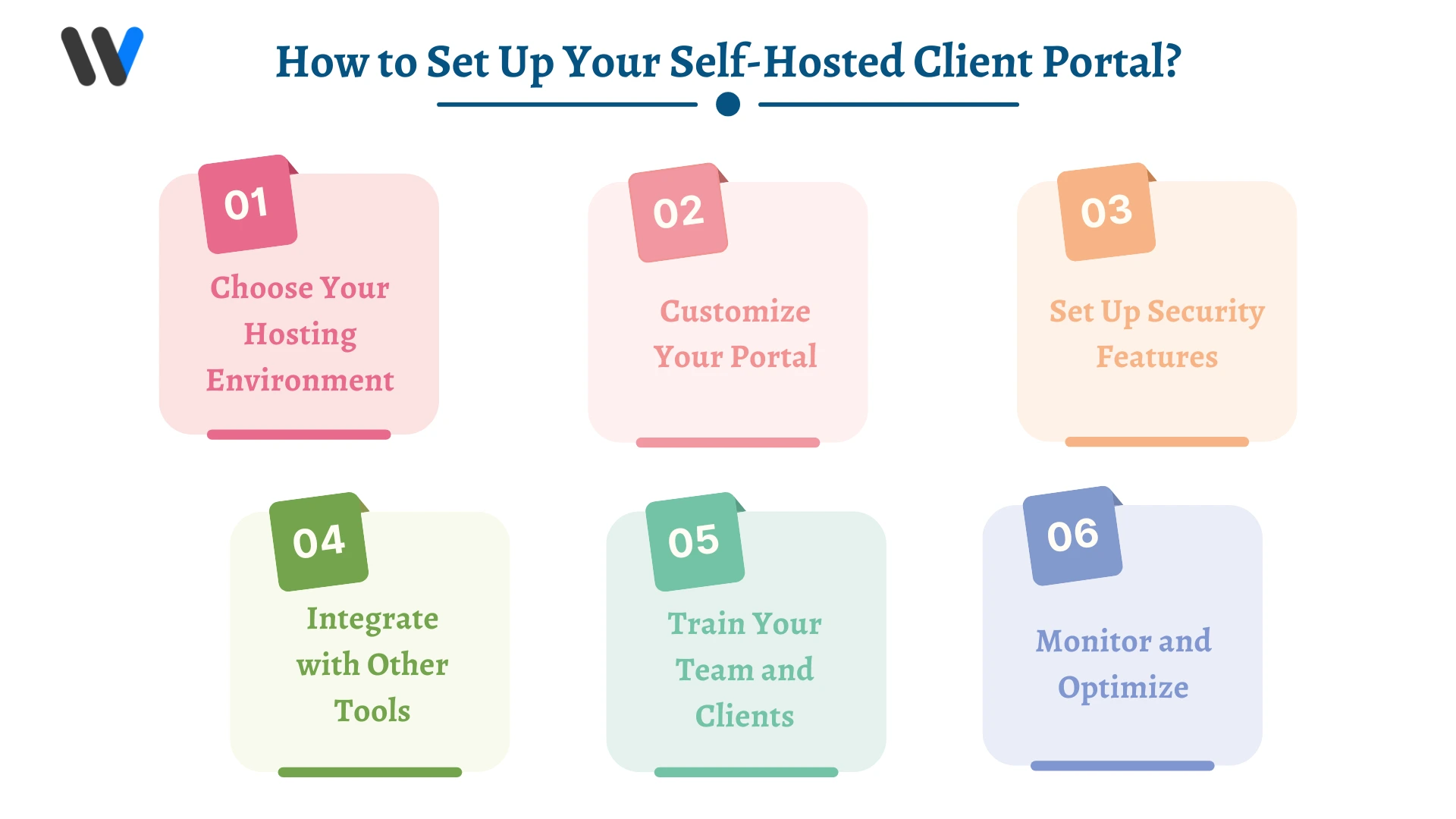Enhancing Client Collaboration with Self-Hosted Client Portals

Redefine Client Collaboration with a Self-Hosted Portal
Client collaboration can make or break a project. Whether it’s sharing documents, tracking progress, or maintaining open communication, clients need an efficient, secure space where they can interact with your team. That’s where a self-hosted client portal comes in, offering a customized solution that keeps you in full control while enhancing the client experience.
Imagine a portal designed specifically for your needs no third-party restrictions, total control over security, and a personalized experience that mirrors your brand. With a self-hosted client portal, you don’t just streamline collaboration, you create a tailored, powerful tool that grows with your business.
In this article, we’ll explore how self-hosted client portals can transform your client relationships, simplify communication, and boost project success. Ready to enhance collaboration? Let’s dive in.
What is a Self-Hosted Client Portal?
A self-hosted client portal is an online platform that businesses use to manage communication, document sharing, and project collaboration directly with their clients. Unlike third-party solutions, a self-hosted portal is hosted on your own servers or infrastructure, providing you with complete control over the environment, security, and customization.
By self-hosting, you’re able to tailor the portal’s design and functionality to suit your specific business needs. Whether it’s a branded user interface, specific security features, or integration with other business tools, self-hosting allows you to create a seamless, personalized experience for your clients.
At Worklenz, we provide a flexible platform that supports self-hosted client portals, making it easier for you to deliver a unique, secure, and efficient collaboration space for your clients. With Worklenz, you can manage tasks, track project progress, and keep clients informed, all in a centralized, branded environment.
Benefits of Using a Self-Hosted Client Portal
A self-hosted client portal offers several distinct advantages that can elevate your client collaboration and streamline your business operations. Here’s why it’s worth considering:
1. Enhanced Control and Customization
With a self-hosted client portal, you’re not limited by the features of third-party platforms. You have full control over the design, functionality, and features, allowing you to create a portal that reflects your brand and meets the specific needs of your clients. Whether it’s adding new tools, customizing the user interface, or integrating with other software, the possibilities are endless.
2. Improved Security and Privacy
One of the biggest concerns for businesses is data security. By using a self-hosted solution, you maintain complete control over your client data. You can implement robust security measures tailored to your business needs, from data encryption to secure authentication protocols. This level of control ensures your clients’ information is kept private and protected, offering peace of mind.
3. Better Client Experience
A self-hosted client portal allows you to create a personalized experience for your clients. By incorporating your branding, messaging, and unique features, clients will feel like they are working within your ecosystem, enhancing their overall experience. The ease of access and consistent interface creates a smooth, professional environment that fosters stronger relationships.
4. Cost-Effective in the Long Run
Although there’s an initial setup cost, a self-hosted portal can save money in the long run. By eliminating recurring third-party fees, you can redirect those savings into other areas of your business. Plus, as your business grows, your self-hosted portal can scale with you without the limitations and fees associated with external platforms.
5. Greater Flexibility and Independence
Self-hosting gives you the flexibility to adjust the portal’s functionality as your business evolves. Unlike third-party tools that can change their pricing models or features without notice, you control the future of your portal. This ensures that it will always align with your business goals and client needs.

Key Features to Look for in a Self-Hosted Client Portal
When selecting a self-hosted client portal for your business, it’s important to look for features that enhance both the functionality and security of your portal. Here are some key features to consider:
Secure Login and Authentication
Client data security is a top priority, and your portal should include secure login options. Features like two-factor authentication (2FA) and single sign-on (SSO) ensure that only authorized users can access sensitive information. These security measures are crucial for protecting both your business and your clients.
Customizable Dashboards
Each client is unique, and a self-hosted portal should allow for personalized dashboards. Customizable views enable clients to track their projects, monitor tasks, and stay updated on relevant information in a way that makes sense to them. Tailoring the experience to each client’s preferences helps foster a more engaged and satisfied client base.
Task Management and Project Tracking
Integrating project management tools into your client portal can streamline workflows and help you stay on top of deadlines. Features like task assignment, progress tracking, and deadlines ensure both you and your clients have full visibility over the project’s status. This transparency can prevent misunderstandings and improve collaboration.
Document Sharing and Collaboration
A client portal should allow for easy document sharing, file storage, and real-time collaboration. Whether you need to exchange project files, proposals, or reports, the portal should have secure file upload and sharing capabilities. This feature minimizes the back-and-forth emails and ensures all documents are centralized and accessible.
Messaging and Communication Tools
Effective communication is the backbone of any successful client relationship. A self-hosted portal with integrated messaging and communication tools helps maintain clear, documented communication between you and your clients. This could include direct messaging, notifications, and email alerts, ensuring you never miss an important update.
Integration with Other Tools
Your self-hosted portal should seamlessly integrate with other business systems, such as CRM tools, billing systems, and project management software. Integration allows for a more streamlined workflow and reduces the need for manual data entry, saving time and reducing errors.
Analytics and Reporting
To track your progress and ensure client satisfaction, your portal should provide detailed analytics and reporting features. These tools can help you analyze project performance, client engagement, and even financial data. With clear insights, you can make informed decisions to improve client collaboration and drive better results.
How to Set Up Your Self-Hosted Client Portal
Setting up a self-hosted client portal doesn’t have to be a complex task. With the right tools and approach, you can create a seamless and secure client experience. Here’s a step-by-step guide on how to get started:

Step 01 - Choose Your Hosting Environment
The first step is to decide where to host your client portal. You can host it on your own servers or choose a cloud provider. Make sure that the hosting environment you select offers scalability, security, and performance to meet the growing needs of your business.
Step 02 - Customize Your Portal
Once your portal is set up, the next step is customization. Tailor the look and feel of the portal to reflect your brand and business requirements. This includes adjusting the layout, color scheme, and adding essential features like task management, file sharing, and communication tools. Customizing the portal helps provide a personalized experience for your clients.
Step 03 - Set Up Security Features
Security is paramount when dealing with sensitive client data. Ensure that your client portal is equipped with strong security measures such as two-factor authentication (2FA), password protection, and data encryption. These features are crucial in safeguarding client information and ensuring secure access.
Step 04 - Integrate with Other Tools
A self-hosted client portal should integrate smoothly with other tools you use, such as project management software, CRM systems, and email platforms. These integrations will allow you to automate tasks, keep data consistent across systems, and streamline workflows for greater efficiency.
Step 05 - Train Your Team and Clients
Once your portal is up and running, it’s important to educate both your team and clients on how to use it. Provide clear documentation or training resources to guide them through the portal’s features and functionalities. A well-informed user base will result in higher engagement and smoother collaboration.
Step 06 - Monitor and Optimize
After launching your portal, regularly monitor its performance to ensure it is meeting the needs of your business and clients. Use analytics to track client interactions, identify potential issues, and make improvements. Continuously refining the user experience will help maintain a high level of client satisfaction.
Best Practices for Client Portal Security
Ensuring that your self-hosted client portal is secure should be a top priority. A secure portal not only protects sensitive client data but also helps build trust and strengthens relationships. Below are key best practices for ensuring the highest level of security for your self-hosted client portal:
- Use Strong Authentication Methods
The foundation of any secure client portal starts with robust authentication methods. Implement two-factor authentication (2FA) or multi-factor authentication (MFA) to add an extra layer of security. This ensures that even if a password is compromised, unauthorized users cannot easily access the portal.
- Regularly Update Software and Security Patches
Ensure that all software, plugins, and tools used to run your client portal are kept up to date with the latest security patches. Hackers often exploit vulnerabilities in outdated systems, so it’s essential to stay on top of updates and fixes. Schedule regular maintenance checks to ensure your platform is secure and fully functional.
- Implement Role-Based Access Control (RBAC)
One of the best ways to minimize security risks is by limiting user access to only the information and features they need. Role-based access control (RBAC) allows you to assign different access levels based on user roles. For example, clients may only have access to their project information, while your team can access the backend for admin purposes.
- Encrypt Data in Transit and At Rest
Data encryption is a must-have for protecting sensitive information. Make sure that all data transferred between clients and the server is encrypted using HTTPS or SSL/TLS protocols. Additionally, encrypt data stored on your servers to protect it in case of a breach. This ensures that even if an unauthorized party gains access to your server, the data remains unreadable.
- Regularly Backup Data
Data loss can occur due to a variety of reasons, including system failures or cyberattacks. To prevent permanent loss, regularly back up your portal’s data to a secure location. This will help you recover client information and continue operations with minimal disruption if something goes wrong.
- Monitor User Activity
Constantly monitor and log user activity within your client portal. By keeping an eye on login attempts, file downloads, and other actions, you can spot suspicious behavior early and act before a potential breach occurs. Many self-hosted platforms offer audit logging tools to track and analyze user interactions.
- Conduct Regular Security Audits
Finally, schedule regular security audits to assess the effectiveness of your portal’s security measures. During these audits, check for vulnerabilities, test security protocols, and evaluate the overall infrastructure to identify areas for improvement. This proactive approach ensures that your client portal remains secure over time.
Seize Control of Client Collaboration: Take the Next Step Today
Empowering client collaboration with a self-hosted portal is no longer a luxury—it’s a strategic advantage. With full control over your data, enhanced security measures, and the flexibility to customize to your exact needs, a self-hosted client portal is an investment that pays off in long-term client trust and business growth.
If you’re ready to create a client experience that stands out and gives your team the tools to succeed, it’s time to take the next step. By implementing a self-hosted solution, you’re not just improving collaboration; you’re future proofing your business.
Take charge of your client relationships today. Start building your secure, customizable self-hosted portal and set the foundation for lasting success!